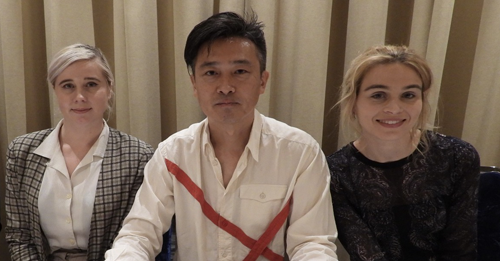Media coverage of the launch
Following the launch, there was a lot of national and international media coverage of the case. Global media attention surrounding the announcement was incredibly positive, with coverage from major newspapers in the UK, China and Australia.
While AFD opted to stay out of Japanese media coverage (putting the spotlight on our incredible Japanese plaintiff Ren instead), our CEO, Sarah Lucas was quoted in ten different languages around the world.
The Guardian reported “Animal rights activists have launched an unprecedented legal challenge to the slaughter of dolphins in Japan, claiming that fishermen are routinely violating animal welfare laws and exceeding government-set quotas.”
Australian Greens senator Peter Whish-Wilson expressed support for the action in a blog post, stating, “this legal challenge will focus the entire international community’s attention on the cruel and inhumane mass slaughter of dolphins that happens too often in Taiji”.
Importantly, coverage in Japan was national and widespread, with most major news outlets reporting on the legal action and discussing the Taiji dolphin hunts.
Along with many other Japanese language publications, Japan Times reported on the legal action with the headline “Environmental campaigners have filed an unprecedented lawsuit in a bid to halt the so-called drive hunting of dolphins in Taiji, Wakayama Prefecture, arguing that the practice is cruel and illegal.”
What was the response from Taiji authorities?
The Taiji Fisheries Cooperative denied local fisherman have exceeded quotas or killed dolphins inhumanely. The Governor of Wakayama responded to the announcement in a brief statement, saying the killing methods used in Taiji have been improved upon, claiming, “the period of time has been reduced to around 10 seconds — a reduction of over 95 per cent.”. (It will be incredibly difficult for them to prove this in court, given the overwhelming evidence to show it is not the case).
We are still awaiting formal responses from the Taiji Governor’s office.
What’s next?
In Japan, the usual process is for the defendant to file a response within 2 months. Therefore we are anticipating the first hearing to fall around April or May in the District Court in Wakayama. This should give us a more comprehensive understanding of what is to come.
In preparation for the first hearing, AFD will be working with the lawyers to add new evidence to the complaint, transporting plaintiffs and lawyers to the hearings, and developing expert testimony.
This will no doubt be a game of patience, as we expect the case to take at least a year. Throughout which, there will be multiple hearings and experts may need to testify in person.
After years of work building a viable case and sourcing lawyers and a plaintiff, the positive support received so far all counts towards building something even stronger, and raising awareness of the cruelty occurring in Taiji.
AFD would like to thank our incredible supporters for getting us to this exciting stage, and we will be sure to keep everyone updated along the way.
